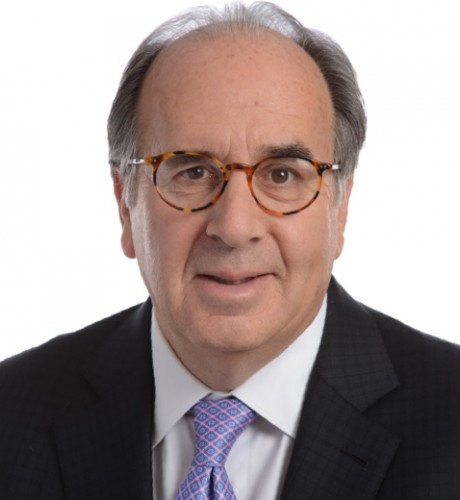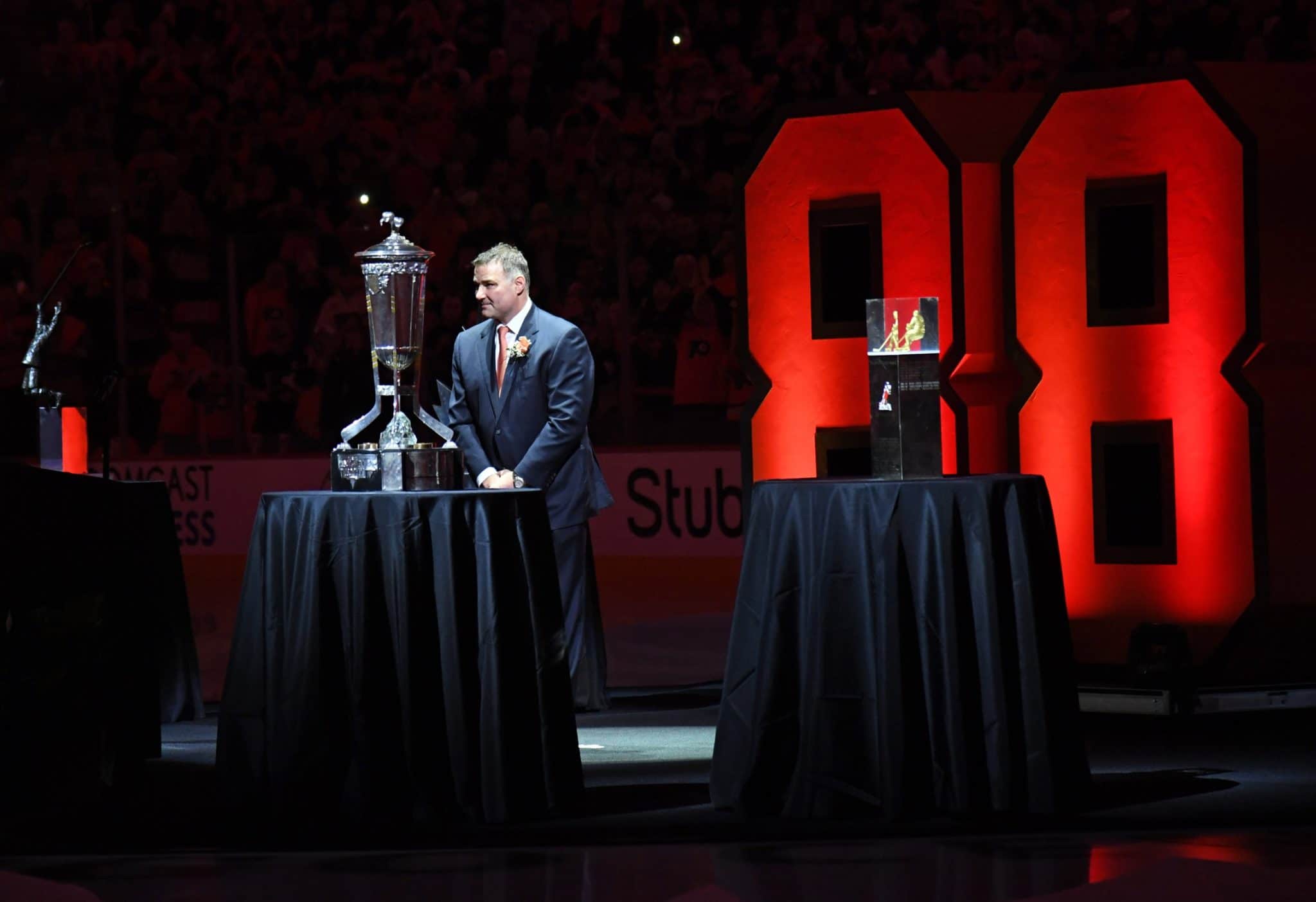Ad Disclosure
Flyers Executive and Counselor Phil Weinberg, 66, Who Successfully Argued Eric Lindros Trade, Dies Suddenly

Phil Weinberg, long-time Executive Vice President and General Counsel for Comcast Spectacor and the Philadelphia Flyers, died unexpectedly late Wednesday as a result of complications stemming from surgery to repair a hernia. Weinberg was 66.
Most Philadelphia sports fans may recognize the name but not quite understand what his role has been in the sporting landscape. Weinberg served in his role for 31 years, the first 25 of which he was considered former Flyers and Comcast Spectacor Chairman Ed Snider’s right-hand man.
Weinberg and Snider became especially close as Snider battled bladder cancer for two years prior to his 2016 death.
“From the moment that we joined forces with Ed Snider to create Comcast Spectacor, Phil was right there as a wonderful and trusted advisor who helped guide us and build the partnership that lives on today,” said Brian L. Roberts, Chairman and CEO of Comcast Corporation. “Phil was a spectacular counselor and leader to the Flyers and Spectator for decades and a friend and mentor to so many. He will be sorely missed.”
Weinberg brokered many deals in his time with Comcast Spectacor, most notably, he was the lawyer who made the compelling argument in arbitration that the Flyers should win the Eric Lindros trade with the Quebec Nordiques rather than the New York Rangers.
NHL.com Senior Writer Adam Kimmelman interviewed Weinberg in 2012 as part of a story commemorating the 20th anniversary of the Lindros trade at the 1992 NHL Entry Draft in Montreal.
In the story, Weinberg talked of flying to Montreal on Saturday night because there was going to be an arbitration hearing and then once arrived, he got a call from his wife that she was going into labor. So, he caught the first flight back to Philadelphia on Sunday morning to be with his wife at the birth of their daughter only to hop on a plane back to Montreal later that afternoon.
The arbitration hearing went on for six days.
Jay Snider, who was running the Flyers at the time in place of his father, remembered Weinberg wanting to be left alone prior to the final day.
“Phil had to figure out basic law and he came up with the basic principle that the existence of a contract is from offer to counteroffer to acceptance,” Jay Snider said. “If you look at the decision, it came down to the fact that (Quebec GM Marcel) Aubut’s call to me and giving me permission to talk to Lindros was the indication that a contract had been reached. At the very basis of it all, that’s an accepted principle in law in all jurisdictions. It indicated that a valid agreement had been reached.”
Weinberg was arguing that the acceptance of a contract can occur in a variety of ways.
“It can occur in writing, it can occur through action — in any way that the parties manifest that they have accepted the offer,” Weinberg said. “That’s sort of hornbook law about what makes a contract. There’s a little bit of discrepancy in the law of the United States and the law of Canada as to how can that acceptance be manifested. In the United States, it has to be … there’s an objective theory of contract formation and a subjective theory of contract formation. The objective theory is, what would the outside person looking at things determine as to whether there had been an acceptance of an offer. And a subjective theory isn’t so much what an outside observer would think, it’s more what you think in your own mind, the accepting party, as to whether you’ve accepted the terms of the offer or not. The European common law that runs through Canadian jurisprudence a little bit more is this subjective theory. And the American theory is the objective theory.”
“What I was able to argue is that by all outward manifestations, Marcel Aubut, who was the person accepting our offer, indicated his consent, indicated his acceptance, because there was this term … one of the things that happened in the arbitration was that we had wanted to talk to Lindros to see if he’d sign with us. And Aubut had said somewhere along the way that if he gave us the number then we had a deal. He did in fact give Jay the number at some point for Lindros so that we could talk to him and see if he would play in Philly. We used that fact.”
Weinberg continued, “What I was able to do was argue that Aubut in the Canadian way of thinking about contract formation, probably in his own mind, didn’t even really know he had made a contract because it was more subjective to his own way of thinking. He, in his own head, was playing out this auction but holding back in his mind the ultimate assent to the offer, the ultimate agreement or acceptance. But that doesn’t matter because the rule of law that should be applied is the objective theory. Any outsider, any third party, anybody looking at his conduct, would believe a contract would be formed because we can’t go into the mind of somebody to really understand what they’re thinking. Which is why we ascribe to this objective theory. Once he met the last term of our offer, which was, give us Lindros’ number to see if he wants to play in Philly, then he had accepted all of the terms by an objective theory. It didn’t really matter what he was thinking about anything. I think that’s what I was really trying to stress.”
Weinberg’s argument won over arbitrator Larry Bertuzzi and changed the face of the Flyers franchise forever.
Eric Lindros at his 2018 number retirement – Eric Hartline/USA Today Sports
“Though he was rarely in the public eye, Phil Weinberg spent three decades expertly performing the critical work that made the Flyers, the National Hockey League and Comcast Spectacor stronger. More importantly, Phil’s contributions heightened both the in-arena and at-home experiences for Philadelphia sports fans and his tireless philanthropic efforts touched and improved countless lives in his community,” said NHL Commissioner Gary Bettman.“ An extraordinary lawyer who served Ed Snider and the Flyers superbly since 1990, Phil was a terrific colleague with sound vision who was respected and well-liked throughout our League. The entire National Hockey League mourns his passing.”
Aside from the Lindros case, Weinberg also oversaw all the legal aspects of the sale of the Philadelphia 76ers, and managed Comcast Spectacor’s interests with the city of Philadelphia on the construction of the CoreStates Center – now Wells Fargo Center – as well as the demolition of the Philadelphia Spectrum and the development of XFinity Live, among many other business transactions, for Comcast Spectactor, the Wells Fargo Center arena and complex, the Flyers, the Philadelphia Wings of the National Lacrosse League, the Philadelphia Fusion of the Overwatch League, and the Maine Mariners of the East Coast Hockey League.
According to his biography on the company website, Weinberg was responsible for all litigation, employment and labor laws, financing, business acquisition and development, as well as player-related matters. In addition, Weinberg oversaw Corporate Communications and Human Resources functions, all while serving as a key advisor to Chairman and CEO Dave Scott.
“Yesterday was the 31st anniversary of Phil Weinberg’s first day with the Flyers, and for more than three decades, Phil poured his heart and soul into this organization and all that it stands for in the city of Philadelphia,” Scott said. “Phil loved the Flyers, he loved our fans, he loved this city, and he loved this organization. He was an invaluable advisor to both Ed Snider and me, he was a beloved mentor and colleague to hundreds of employees over the years, and he cherished the history and tradition of this organization.
“Phil’s passing is heartbreaking for me personally and for everyone here because he exemplified the unique culture that the Flyers have built over the years, based on loyalty, determination, and family. He was, and will remain, an institution within the Flyers organization, but above all, we will remember him as a kind, brilliant friend and devoted husband and father.”
Weinberg actively served on the Board of Directors of the Ed Snider Youth Hockey Foundation, Flyers Charities, Philadelphia Futures and Big Brothers/Big Sisters of Southeastern Pennsylvania and was an Alternate Governor of the National Hockey League, representing the Flyers.
He previously served as the Executive Vice President of Legal and Business Affairs for Comcast’s Regional Sports Network group from 2008 through 2012, which included the completion of Comcast’s acquisition of NBCUniversal.
Weinberg originally joined Comcast Spectacor in 1990, coming over from the Philadelphia law firm of Sprague and Sprague. After graduating from Hamilton College in 1977, Weinberg worked as an assistant to the commissioner of the New York City Department of Environmental Protection.
He earned his law degree in 1983 from Boston University, and lived in Philadelphia with his wife Terry and two children, Sydney and Zach.
Anthony SanFilippo writes about the Phillies and Flyers for Crossing Broad and hosts a pair of related podcasts (Crossed Up and Snow the Goalie). A part of the Philadelphia sports media for a quarter century, Anthony also dabbles in acting, directing, teaching, and strategic marketing, which is why he has no time to do anything, but does it anyway. Follow him on Twitter @AntSanPhilly.
